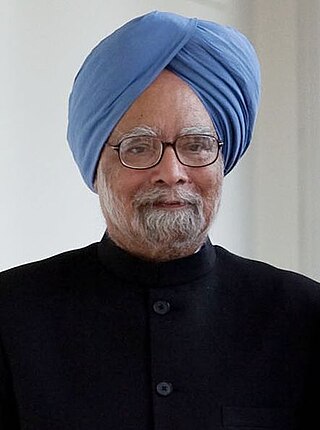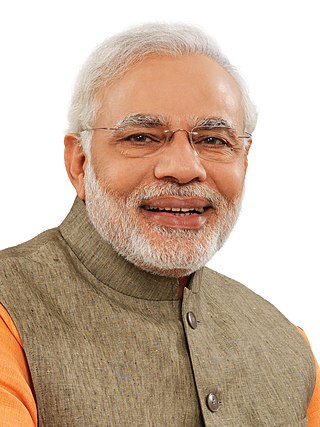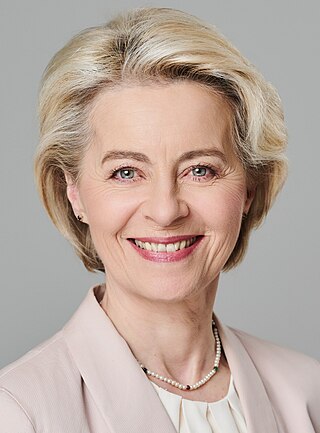
An election is a formal group decision-making process by which a population chooses an individual or multiple individuals to hold public office.
2024 (MMXXIV) is the current year, and is a leap year starting on Monday of the Gregorian calendar, the 2024th year of the Common Era (CE) and Anno Domini (AD) designations, the 24th year of the 3rd millennium and the 21st century, and the 5th year of the 2020s decade.

The Indian National Congress (INC), colloquially the Congress Party or simply the Congress, is a political party in India with deep roots in most regions of India. Founded on 28 December 1885, it was the first modern nationalist movement to emerge in the British Empire in Asia and Africa. From the late 19th century, and especially after 1920, under the leadership of Mahatma Gandhi, the Congress became the principal leader of the Indian independence movement. The Congress led India to independence from the United Kingdom, and significantly influenced other anti-colonial nationalist movements in the British Empire.
The incumbent is the current holder of an office or position. In an election, the incumbent is the person holding or acting in the position that is up for election, regardless of whether they are seeking re-election.

The National Democratic Alliance (NDA) is a right-wing conservative Indian political alliance led by the right-wing Bharatiya Janata Party (BJP). It was founded in 1998 and currently controls the government of India as well as the government of 17 Indian states and one Union territory.

General elections were held in India in four phases between 20 April and 10 May 2004. Over 670 million people were eligible to vote, electing 543 members of the 14th Lok Sabha. Seven states also held assembly elections to elect state governments. They were the first elections fully carried out with electronic voting machines.

The 2004 United States presidential election was the 55th quadrennial presidential election, held on Tuesday, November 2, 2004. The Republican ticket of incumbent President George W. Bush and his running mate incumbent Vice President Dick Cheney were elected to a second term, defeating the Democratic ticket of John Kerry, a United States senator from Massachusetts and his running mate John Edwards, a United States senator from North Carolina.
An independent, non-partisan politician or non-affiliated politician is a politician not affiliated with any political party or bureaucratic association. There are numerous reasons why someone may stand for office as an independent.

General elections were held in India in five phases between 16 April 2009 and 13 May 2009 to elect the members of the fifteenth Lok Sabha. With an electorate of 716 million, it was the largest democratic election in the world until being surpassed by the 2014 general election.

General elections were held in India in nine phases from 7 April to 12 May 2014 to elect the members of the 16th Lok Sabha. With 834 million registered voters, they were the largest-ever elections in the world until being surpassed by the 2019 elections. Around 23.1 million or 2.7% of the total eligible voters were aged 18–19 years. A total of 8,251 candidates contested the 543 elected Lok Sabha seats. The average election turnout over all nine phases was around 66.40%, the highest ever in the history of Indian general elections.

The 2012 United States presidential election was the 57th quadrennial presidential election, held on Tuesday, November 6, 2012. Incumbent Democratic President Barack Obama and his running mate, incumbent Vice President Joe Biden, were re-elected to a second term. They defeated the Republican ticket of former Governor Mitt Romney of Massachusetts and Representative Paul Ryan of Wisconsin.

The 2016 United States presidential election was the 58th quadrennial presidential election, held on Tuesday, November 8, 2016. The Republican ticket, businessman Donald Trump and Indiana governor Mike Pence defeated the Democratic ticket of former secretary of state and First Lady of the United States Hillary Clinton and the junior senator from Virginia, Tim Kaine, in what was considered one of the biggest political upsets in American history. It was also the sixth presidential election in which both major party candidates were registered in the same home state; the others have been in 1860, 1904, 1920, 1940, and 1944.

General elections were held in India in seven phases from 11 April to 19 May 2019 to elect the members of the 17th Lok Sabha. Votes were counted and the result was declared on 23 May. Around 912 million people were eligible to vote, and voter turnout was over 67 per cent – the highest ever, as well as the highest ever participation by women voters.

The Election Commission of India (ECI) is a constitutional body established by the Constitution of India empowered to conduct free and fair elections in India. The Election commission is headed by a Chief Election Commissioner and consists of two other Election Commissioners.

The 2020 United States presidential election was the 59th quadrennial presidential election, held on Tuesday, November 3, 2020. The Democratic ticket of former vice president Joe Biden and the junior U.S. senator from California Kamala Harris defeated the incumbent Republican president, Donald Trump, and vice president, Mike Pence. The election took place against the backdrop of the global COVID-19 pandemic and related recession. The election saw the highest voter turnout by percentage since 1900, with each of the two main tickets receiving more than 74 million votes, surpassing Barack Obama's record of 69.5 million votes from 2008. Biden received more than 81 million votes, the most votes ever cast for a candidate in a U.S. presidential election.

The 2024 United States presidential election will be the 60th quadrennial presidential election, set to be held on Tuesday, November 5, 2024. Voters will elect a president and vice president for a term of four years. Incumbent President Joe Biden, a member of the Democratic Party, is running for re-election. His predecessor Donald Trump, a member of the Republican Party, is running for re-election for a second, non-consecutive term, after losing to him in 2020. If both are nominated, this will mark the first presidential election rematch since 1956.

The 2024 European Parliament election is scheduled to be held from 6 to 9 June. This will be the tenth parliamentary election since the first direct elections in 1979, and the first European Parliament election after Brexit. This election will also coincide with a number of other elections in some European Union member states.

The 2024 United States House of Representatives elections will be held on November 5, 2024, as part of the 2024 United States elections, to elect representatives from all 435 congressional districts across each of the 50 U.S. states, as well as 6 non-voting delegates from the District of Columbia and the inhabited U.S. territories. Special elections may also be held on various dates throughout 2024. Numerous other federal, state, and local elections, including the U.S. presidential election and elections to the Senate, will also be held on this date. The winners of this election will serve in the 119th United States Congress, with seats apportioned among the states based on the 2020 United States census.














